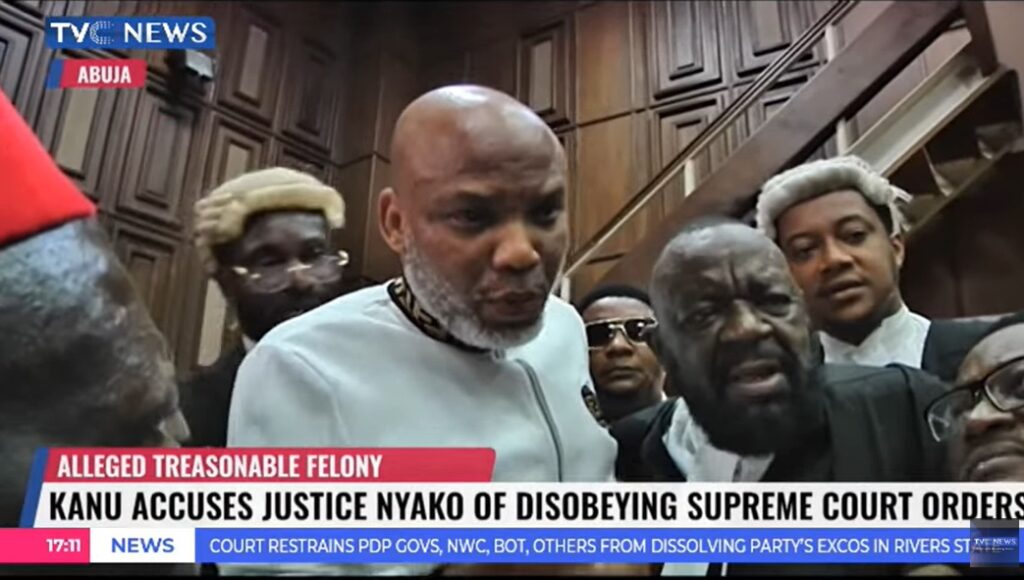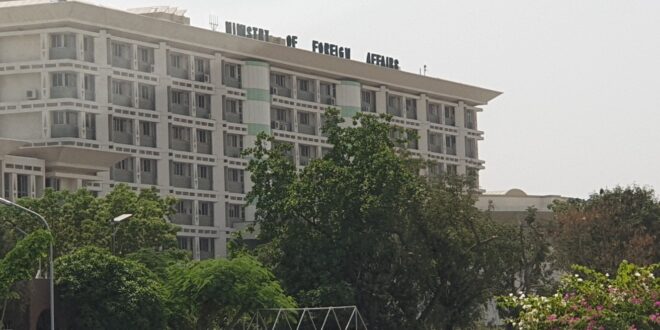A new Change.org campaign, initiated by Uchechi Okwu-Kanu, wife of Nnamdi Kanu, leader of the Indigenous People of Biafra (IPOB), is gaining momentum. The petition is directed to UK Prime Minister Keir Starmer, Foreign Secretary David Lammy, and Attorney General Richard Kermer Q.C., urging them to use diplomatic and economic means to secure Kanu’s immediate release from Nigerian detention. Kanu, a British citizen, has been held in prison in Abuja, Nigeria, for the last three years.
Uchechi Okwu-Kanu’s petition describes her husband’s suffering since his arrest in 2021, which she claims was an “extraordinary rendition” orchestrated by Nigerian authorities.

Kanu was allegedly abducted from Kenya, drugged and tortured before being forcefully flown back to Nigeria. Despite a United Nations Working Group’s recommendation for his release, Nigerian authorities have continued to hold him. His health, according to the petition, has deteriorated, and he is in urgent need of medical attention.
Nnamdi Kanu and the IPOB Movement
Nnamdi Kanu, 57, is a prominent political figure in southeastern Nigeria, where he leads the IPOB movement. IPOB advocates for the independence of Biafra, a region in southeastern Nigeria that unsuccessfully attempted to secede in 1967, sparking the Nigerian Civil War.
Kanu has campaigned for self-determination for the Igbo people, using both diplomatic and media channels such as his Radio Biafra platform. His fiery rhetoric has led to accusations from the Nigerian government of inciting violence, with IPOB’s armed wing, the Eastern Security Network (ESN), being linked to attacks on security forces.
Kanu’s supporters argue that his struggle is peaceful and focused on ending the marginalisation of the Igbo people in Nigeria. However, critics, including government officials, claim that IPOB’s activities have destabilized the southeast, undermining national unity.
The points raised in the petition
Uchechi Okwu-Kanu’s petition focuses on her husband’s status as a British citizen, appealing to the UK government to intervene on behalf of her family, including their two young children. She notes the emotional and psychological toll that his absence has taken on their family. The youngest of their children, only eight years old, repeatedly asks when his father will return.
The petition also emphasizes the alleged illegality of Kanu’s rendition from Kenya and his continued detention, which violates international human rights laws. “We are all anxious about his deteriorating health,” Uchechi writes, stressing that the UK government’s failure to act on behalf of its citizen is a breach of obligations under both international law and the European Convention on Human Rights (ECHR).
Supporters vs. Critics of Kanu’s Release
Proponents of Kanu’s release argue that his detention is unjust and part of a larger campaign of suppression against the Igbo people in Nigeria. Many supporters claim that Kanu is being punished for advocating for the rights of the southeastern region, a region they feel is politically and economically marginalized. The appeal court ruling in Kanu’s favour and the UN’s recommendation for his release are often cited as reasons for immediate action.
One supporter of the petition noted, “Nnamdi Kanu’s continued detention is not only illegal but also a violation of his fundamental human rights. He deserves justice, and his family deserves to have him home.”
On the other hand, critics of Kanu’s release argue that IPOB has been linked to violent activities in the southeastern region, which has contributed to instability in Nigeria. They believe that freeing Kanu would embolden separatist movements and could potentially reignite ethnic tensions. “Kanu has spread dangerous separatist rhetoric that threatens Nigeria’s unity. His release could lead to further violence,” one critic remarked.
The Political Landscape in Nigeria
President Bola Tinubu’s administration is navigating multiple security challenges, including insurgency in the northeast, banditry in the northwest, and IPOB’s agitation in the southeast. Ethnic and political divisions remain a significant challenge in Nigeria, where many believe the central government favours certain regions over others.
The campaign led by Uchechi Okwu-Kanu adds international pressure on the Nigerian government, with UK authorities now being asked to intervene. As the petition gains signatures, it highlights the growing tension over Kanu’s case, which has become a flashpoint for both advocates of human rights and those concerned about Nigeria’s territorial integrity.
The fate of Nnamdi Kanu, as well as the response of the UK and Nigerian governments, will likely have far-reaching implications for Nigeria’s political stability and international diplomatic relations.
Adira Kallo
 THE AFRICAN COURIER. Reporting Africa and its Diaspora! The African Courier is an international magazine published in Germany to report on Africa and the Diaspora African experience. The first issue of the bimonthly magazine appeared on the newsstands on 15 February 1998. The African Courier is a communication forum for European-African political, economic and cultural exchanges, and a voice for Africa in Europe.
THE AFRICAN COURIER. Reporting Africa and its Diaspora! The African Courier is an international magazine published in Germany to report on Africa and the Diaspora African experience. The first issue of the bimonthly magazine appeared on the newsstands on 15 February 1998. The African Courier is a communication forum for European-African political, economic and cultural exchanges, and a voice for Africa in Europe.

































